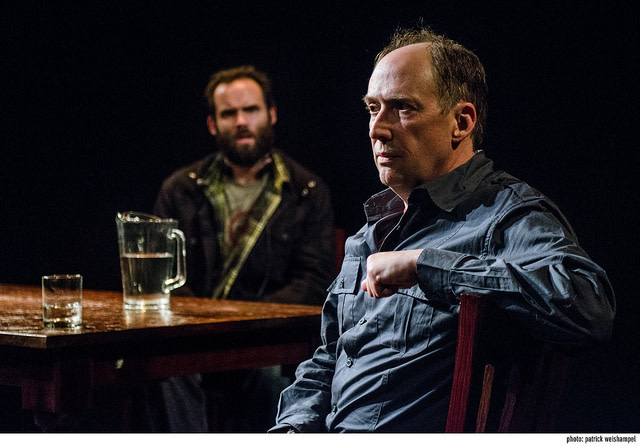Review: Portland Center Stage's Body of an American

William Salyers (foreground, as Paul Watson) and Danny Wolohan (as Dan O'Brien)
Image: Patrick Weishampel
Body of an American, Portland Center Stage's new production, is inspired in part by the memoir the play's central subject, real-life war photojournalist Paul Watson, wrote in 2008, Where War Lives. The book's title comes from a thought Albert Camus jotted in his notebook just days after the Nazis invaded Poland and World War II began. “We used to wonder where war lived, what it was that made it so vile,” the philosopher wrote. “And now we realize that we know where it lives, that it is inside ourselves...It is in this terrible loneliness both of the combatants and of the noncombatants, in this humiliated despair we all feel, in the baseness that we feel growing in our faces as the days go by. The reign of beasts has begun.”
Playwright Dan O'Brien's work, receiving its world premiere from PCS, is essentially about the places in all of us in which war resides: the damage we've sustained that causes us to inflict damage on others; the dark drives that, writ large, are violence's life-force.
The play, under the direction of Oregon Shakespeare Festival Artistic Director Bill Rauch, spelunks these shadowy psychic spaces brilliantly. It tells the story of the relationship between two troubled men: Paul Watson is a veteran war photojournalist who for the Los Angeles Times and the Toronto Star has visually chronicled many of the most horrific conflicts of recent decades. After shooting his best-known photograph, a Pulitzer Prize-winning picture of Somalians dragging a dead U.S. soldier's body through the streets during their country's 1993 civil war, Watson, until this point as hardboiled as they come, finds himself racked with guilt about having desecrated the body of the American—and suspicious of his own motivations for repeatedly putting himself in harm's way.
O'Brien, meanwhile, is a playwright bedeviled by his own specters: low self-worth, advancing depression, a family history of mental illness. He contacts Watson after hearing him on Fresh Air, and the two strike up a two-year epistolary conversation culminating in a face-to-face meeting in the surreal setting of the Arctic Circle (where Watson's covering Inuit issues). Watson and O'Brien, a journalist and a playwright, are storytellers and story-seekers, and over the course of their exchange, they seek in each other stories to tell themselves in order to exorcise their personal demons.
O'Brien's script is a masterwork. Dense with meaning and intricately shaded character portraits, but artfully light-handed in its exposition, it's a telling you would almost rather read and reread, underline and scrawl in the margins of, than see pass fleetingly before the footlights. The minimalist two-man staging, in which co-leads William Salyers (Watson) and Danny Wolohan (O'Brien) play not only their own character but, often, one another's character, as well as a diverse cast of supporting characters, is original but not ostentatious, always employing its dialogic gimmicks with purpose. Multimedia elements, such as projected images and sound effects, are also well-employed, helping keep the sparse set engaging. Not that Wolohan and Salyers' performances aren't engaging enough; indeed, they are feats: More than two hours of complexly choreographed, dialogue-heavy, and emotionally demanding acting which the performers dispatch commandingly.
If Body has a flaw, it's that O'Brien doesn't quite adequately expose his own. The author Jonathan Franzen, in a 2010 Fresh Air interview, told Terry Gross that for his writing to have life, he's had to shed various kinds of “armor.” “I went to the deeper, more upsetting things, which were much harder to get onto the page but whose presence I could feel...like some pool of magma beneath the crust,” he said. O'Brien, as a playwright, has reserved for himself a layer of armor, giving Watson more dialogue than his own character, for instance, and letting the audience see Watson, but not him, in private settings such as a psychiatrist's office. To be sure, O'Brien does sometimes make his character vulnerable, most memorably in a revelatory speech at Act One's end. Body would have benefited, however, if the playwright had tapped yet deeper—magma-deep—into where war lives in him.
Body of an American runs through November 4. For more information, visit PCS' website.
For more about Portland arts, visit PoMo's Arts & Entertainment Calendar, stream content with an RSS feed, sign up for our weekly On The Town Newsletter, or follow us on Twitter @PoMoArt. Blog content reflects the views of the individual author and not necessarily SagaCity Media, Inc..




